19 Evidence-Based Health Benefits of Avocado
What is Avocado
The avocado is a tree native to Central America and Mexico and classified in the flowering plant family Lauraceae.
The avocado fruit is also referred to as the fatty fruit of the avocado tree, which is known as Persea Americana in the scientific circles.
Avocado is rich in monounsaturated fats, which make its texture creamy and smooth.
Compared to most other fruits, avocado is much higher in fat.
Avocado can be said to have a unique nutrition profile if you take into consideration the fact that it contains a lot of fiber, vitamins, and minerals such as vitamin K, vitamin E, vitamin C and B-vitamins, potassium, and copper.
The benefits of eating avocado have been linked to the reduced risk of cardiovascular disease.
Due to the nutritional value of avocado, it is very satiating, thus helpful for weight loss.
As for eating avocado, it can be eaten raw, but can also be prepared and used in foods such as guacamole.
There are various types of avocado that are different in color, shape, and size.
On first glance, you may confuse it with pear because of its shape and the fact that it comes in many different tones of green, ranging from light green to black when fully ripe.
The most popular type of avocado is Hass avocado, which is round in size and black in color.
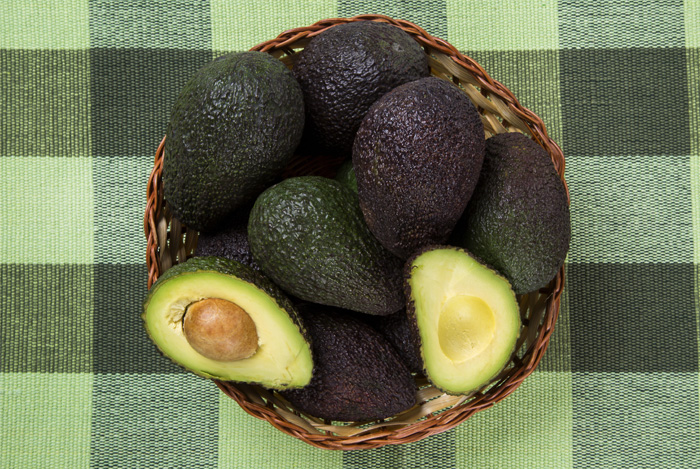
Avocado History
The word “avocado” is said to be derived from the Nahuatl word “ahuacatl”, which means “testicle”.
Sometimes, you may also see this variant of spelling – “avacado”.
Obviously, it describes the fruit shape and likely refers to the potency of avocado, which is believed to be an aphrodisiac.
The Mesoamericans had discovered this fruit and avocados have been a part of the Mexican diet for a long time.
According to some archaeological evidence, avocado consumption goes back almost 10,000 years in central Mexico.
Later, the tribes such as Maya and Olmec domesticated this tree and grew their own avocado fruit.
The first Europeans ate avocados in the 16th century.
It was Spanish explorers who consumed this fruit first among all other Europeans.
The Spanish had their own word for the fruit: “aguacate”.
Thanks to the Spanish Conquest, avocados became widespread through Mexico, Central America, and parts of South America.
Eventually, the Spanish brought avocados to Europe.
When people in Europe and North America got to know this fruit, they could describe the three main types of avocados: Guatemalan, Mexican, and West Indian.
George Washington once described finding and eating avocados in the West Indies and later wrote that the “agovago pears” were a popular food.
The word “avocado” is believed to have originated as a word coinage that was formatted by Sir Hans Sloane, an Irish naturalist, in 1696.
Florida was the first place to plant avocado in the U.S.; this occurred in 1833.
However, it took almost a century for an avocado to become a commercial crop.
Even though avocado was popular in California, Florida, and Hawaii, it was avoided in other states.
Since the 1950s, avocado has been gaining widespread popularity.

Nutrition Facts
Avocado consists of 73% water, 15% fat, 8.5% carbohydrates (mostly fibers), and 2% protein.
Half an avocado (which is 68 grams) contains 109 calories, which is equal to 160 calories per 100 grams.
The following table allows you to take a look at the data on all the nutrients in avocado (1).
Carbs
One of the advantages of avocado is that avocados contain small amounts of sugar in comparison to other fruits.
Half an avocado (68 grams) contains only 0.5 grams of sugar in three main forms: fructose, glucose, and galactose (2).
The net digestible carbs weigh only 1.8 grams for every 100 grams of avocado.
Due to the low sugar content, avocados are expected to have a very low glycemic index score, meaning that they should not raise blood sugar levels to a great extent (3).
Fiber
Fiber is the most present carbohydrate content (79%) of avocado pear.
Half an avocado provides a substantial amount of 4.5 grams of fiber.
Dietary fiber plays an important role as a dietary component and brings about many health benefits.
It is capable of regulating appetite, feeding the friendly bacteria in the gut, and reducing the risk of many diseases (4, 5, 6, 7).
The importance of avocado benefits for health is also in a high content of FODMAPs (fermentable oligo-, di-, monosaccharides, and polyols), which stands for short-chain carbohydrates that some people are intolerant to and cannot digest(8).
Not everyone is intolerant to FODMAPs, but certain unpleasant digestive symptoms may occur if you suffer from irritable bowel syndrome (IBS).
Fat
Avocado is a very unusual fruit because it is packed with monosaturated fatty acids, which are not that abundant in other fruits.
One of the most abundant fatty acids is oleic acid and it can also be found as the main component of olive oil.
Oleic acid has been associated with reducing inflammation and having beneficial effects on cancer (9, 10, 11).
Avocado oil has been reported to be a great source of healthy fats, which is backed by animal studies that suggest it has a protective effect against inflammation, diabetes, and heart disease (12, 13).
Vitamins and Minerals
Avocados are abundant in different essential vitamins and minerals; the most common ones are listed below.
- Folate (B9): A lot of folates is found in avocados; it is essential for normal cell function and tissue growth, making it an important nutrient for pregnant women (15).
- Vitamin K1: This vitamin is important for blood clotting and may have beneficial effects on bone health (16, 17).
- Potassium: Potassium is an essential mineral when it comes to blood pressure control and heart health (18, 19). Avocados actually contain more of this beneficial mineral compared to bananas (1).
- Copper: The Western diet is low in copper and often excludes this beneficial element. Low copper intake may cause adverse effects on heart health (20).
- Vitamin E: This Vitamin is a powerful antioxidant and can often be found in fatty plant foods that are very rich in this vitamin.
- Vitamin B6: This is actually a group of related vitamins that are responsible for converting food into energy.
- Vitamin C: This is an important antioxidant for immune function and skin health (21).
Other Plant Compounds
Apart from all these healthy compounds, avocados are also rich in:
- Carotenoids: Avocados contain various carotenoids like zeaxanthin and lutein’ these two are beneficial for eye health and can reduce the risk of age-related eye diseases (22, 23).
- Persenones A and B: These are unique antioxidants that may protect the body against inflammation and cancer (24, 25).
- D-Mannoheptulose: A type of sugar found in avocados; it has been reported to assist in blood sugar control (26, 27, 28).
Avocado is very high in carotenoid antioxidants.
Because of this, eating fat along with these antioxidants causes an increase in their absorption into the body.
Due to the fact that avocado is high in fat, the carotenoid antioxidants that are found in it are particularly well absorbed (29).
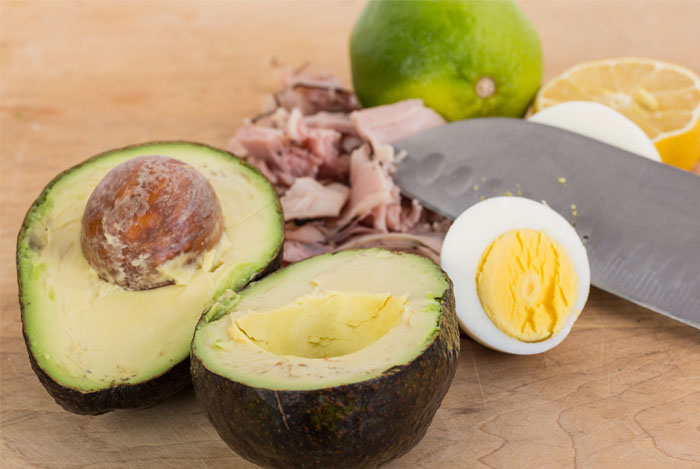
Health Benefits of Avocado
Avocado pear is considered as a unique type of fruit due to its important nutrients such as antioxidants, which are essential for a healthy diet.
Unlike most fruits that consist primarily of carbohydrates, avocado fruit benefits include a high content of healthy fats as well as other potent nutrients, making it very beneficial for your health.
It is no wonder that avocado brings about many health benefits that are easily supported by scientific research.
So, what are the benefits of avocado?
Here are 15 health benefits of avocado pear.
Very Nutritious
Avocado has become incredibly popular among health-conscious individuals for its health benefits.
It is often referred to as a superfood, which does not come as surprise given its numerous health properties (30, 31).
The most popular type of avocado is called Hass avocado and it can weigh anywhere from 8 ounces (220 grams) to 3 pounds (1.4 kg).
Due to its shape, green color, and bumpy skin, it is often called “alligator pear”.
The yellow-green flesh inside the fruit is eaten, while the skin and seed are discarded.
Due to a wide variety of nutrients, it contains, including 20 different vitamins and minerals, avocados are some of the most potent fruits.
In the list below are some of the most abundant nutrients in a single 3.5 ounce (100 gram) serving (32):
- Vitamin K: 26% of the RDA.
- Folate: 20% of the RDA.
- Vitamin C: 17% of the RDA.
- Potassium: 14% of the RDA.
- Vitamin B5: 14% of the RDA.
- Vitamin B6: 13% of the RDA.
- Vitamin E: 10% of the RDA.
- It also contains small amounts of Iron, Copper, Manganese, Magnesium, Zinc, Phosphorous, Vitamin A, B1 (Thiamine), B2 (Riboflavin) and B3 (Niacin).
All of these contain 160 calories, 2 grams of protein, and 15 grams of healthy fats.
Even though it contains 9 grams of carbs, only two of them are “net” carbs, while seven of those are fiber, thus making avocado a low-carb, friendly plant food.
Another thing that makes avocado a superfood is the fact that it does not contain any cholesterol or sodium and is low in saturated fat.
Because of the low percentage of saturated fat that is found in avocado, many “old school” experts consider it a superfood.
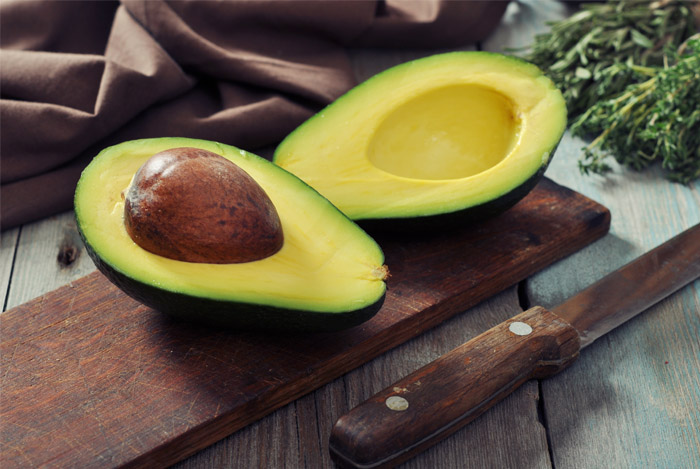
Causes Satiety and Weight Loss
There is a misconception about avocados and their adverse effects when it comes to weight loss programs and diets.
Some people think that avocados should be avoided in calorie-restricted diets because of the fact they are high in fats.
On the contrary, eating and incorporating avocados into your diet is not going to prevent you from losing weight.
In fact, adding avocados to your meals will help you feel more satiated, which will eventually reduce your desire to eat more and eat more often.
It’s been proven that similar meals without avocados do not cause as much satiety (33, 34).
Taking all of this into account, it is clear that avocados may be an excellent supplement to an effective weight loss diet.
Plus, what makes avocado a weight-loss friendly food is the fact it is high in fiber, low in carbs, and does not raise blood sugar levels (35, 36).
Reduces Symptoms of Arthritis
Arthritis has become one of the most widespread diseases in Western countries.
It is characterized by progressive deterioration of the joint cartilage.
Since it is progressive, it can also be progressively treated.
Some of the treatments are supplements made from avocado and soybean oils.
Avocado oil (33%) and soybean oil (66%) are primarily used to suppress and finally treat symptoms in people suffering from arthritis.
According to multiple studies, these supplements have been reported to reduce symptoms of arthritis, especially in the knee and hip area (37, 38, 39, 40, 41).
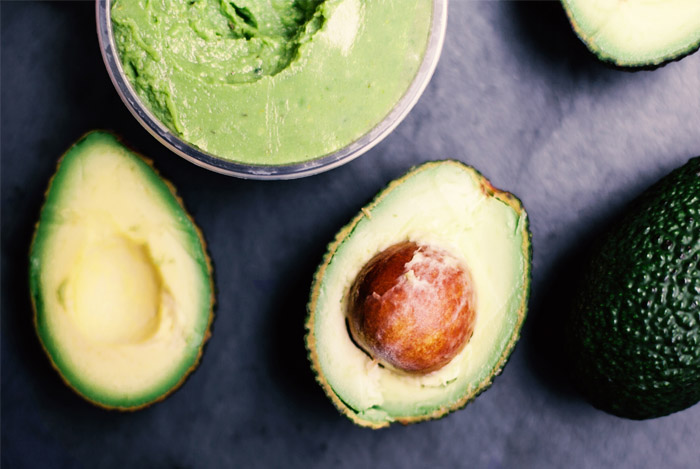
Contains More Potassium than Banana
Potassium is one of those nutrients that most people are lacking in their diet (42).
This nutrient not only helps maintain electrical gradients in the cells of the body but it is also beneficial to various important body functions.
Avocados are very rich in this nutrient. 100 grams of an avocado (3.5 ounces) serving contains 14% of the RDA.
Banana, which is considered a typical high-potassium food, contains only 10% of potassium (43).
In some studies, it is proved that having a high potassium intake is associated with reduced blood pressure, which is a major risk factor for heart attacks, strokes, and kidney failure(19).
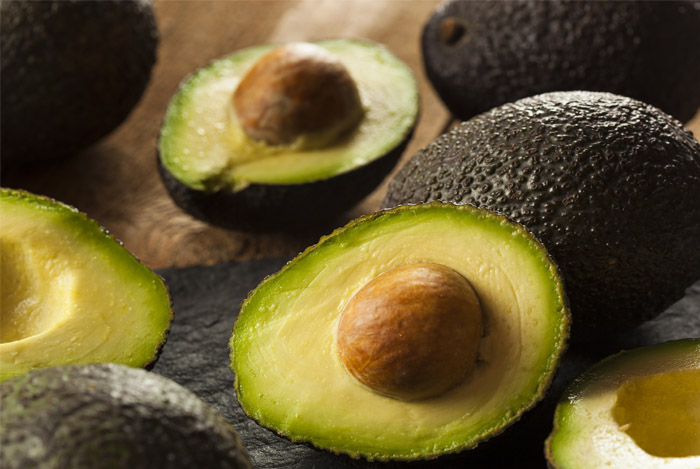
Lowers Cholesterol and Triglyceride Levels
Heart disease is the number one cause of death in the world for both men and women (44).
Several blood markers are associated with an increased risk of heart disease: cholesterol, blood pressure, triglycerides, inflammatory markers, and many others.
Avocados health benefits have been tested and studied in eight human controlled trials so as to find out about their effects on these risk factors.
These studies included splitting into groups, where one group was instructed to eat avocado, whereas the other one was restricted from eating it.
The results were to give insight into what happens to the patients’ blood markers over time.
The studies have shown that avocados have the ability to (33, 45, 46, 47, 48, 49, 50):
- Reduce total cholesterol levels to a great extent.
- Increase HDL (the “good”) cholesterol by up to 11%.
- Lower LDL cholesterol by up to 22%.
- Reduce blood triglycerides by up to 20%.
In one of the studies, it was proven that incorporating avocado into a low-fat vegetarian diet led to improvements in the cholesterol profile (51).
Even though these results are promising and encouraging, the studies that were conducted on avocado and its benefits were small (13-37 patients) and short-term (1-4 weeks).
Nonetheless, you should not overlook the impressive results.
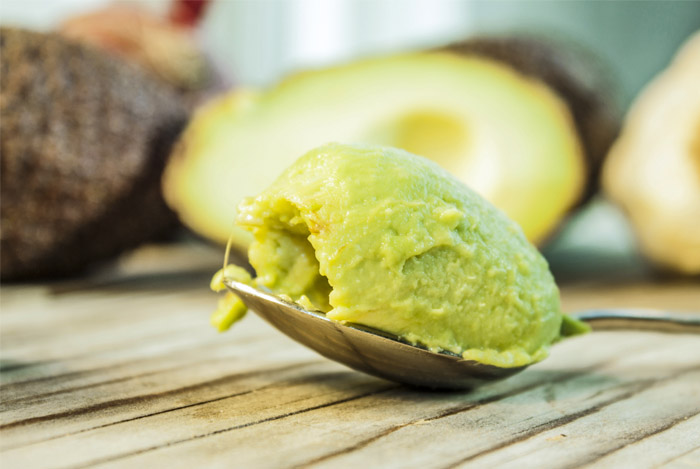
Causes General Health Improvements
Many people struggle at keeping up with healthy dietary habits.
Not many people are aware of how many fruits can improve their health.
One of those fruits is avocado.
The study conducted on 17,567 participants in the NHANES survey in the U.S. showed that avocado consumers were much healthier than people who did not eat avocado.
Due to its high nutritional values, avocado helped those people to have a much higher nutrient intake.
This helped in reducing the risk of suffering from metabolic syndrome – a cluster of symptoms that are a major risk factor for diabetes and heart disease (52).
Also, people who were eating avocado on a regular basis were reported to lose weight, have a lower BMI, and significantly less belly fat.
Furthermore, these people also had more HDL (the “good”) cholesterol levels.
Nevertheless, once again, these results are no guarantee that avocado is the real causation of health improvements.
Still, it takes time for an avocado to become a recognized and acknowledged health supplement.
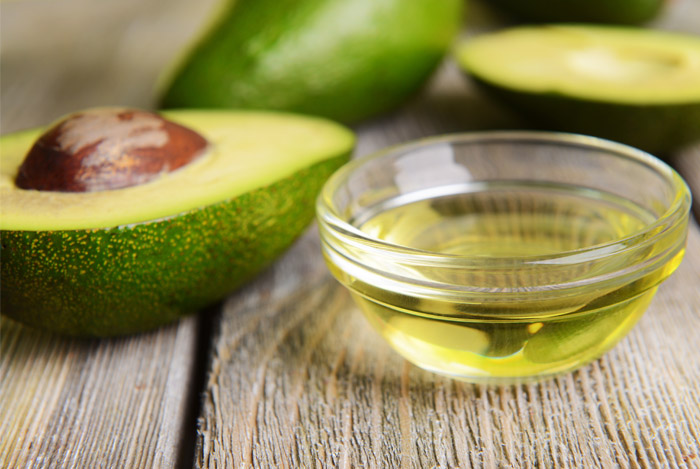
Absorbs Nutrients From Plant Foods
When it comes to a number of nutrients, it is not the only thing that counts.
Some plants are very rich in many nutrients, but their ability to absorb them is not that great.
The ability to absorb nutrients from the digestive tract and into your body is what makes these nutrients count.
Some nutrients are so-called “fat soluble”, which means that they need to be combined with fat in order to be used and utilized.
Fat-soluble nutrients are vitamins A, D, E, and K, as well as antioxidants like carotenoids.
One study proved that adding avocado or avocado oil to a meal, salad, or salsa may increase antioxidant absorption by 2.6 to 15-fold (53).
Besides the fact that avocado is highly nutritious, it can also dramatically increase the nutrient value of other plants that you eat by being incorporated into your diet.
Avocado is an excellent fat source and this is the reason for including it in your healthy vegetarian diet.
Without fat, all other nutrients may go to waste.
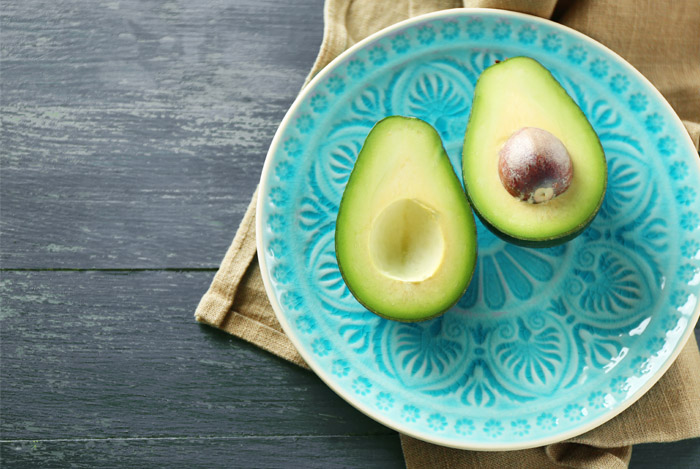
Protects Your Eyesight
Not only do avocados benefits help you with antioxidant absorption from other foods, but the fruit is also rich in antioxidants itself.
Some of the antioxidants found in avocado are Lutein and Zeaxanthin, which are essential for eye health and eyesight (54, 55).
Some studies have come up with the results where these antioxidants are linked with the reduced risk of cataracts and macular degeneration, especially common in the elderly (56, 57).
As a result, eating plenty of avocadi will provide your body with benefits for your eyes over the long term.
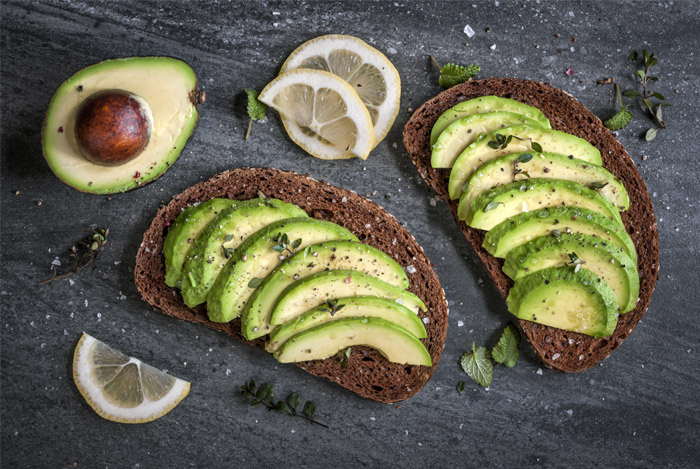
Beneficial for Pregnant Women
According to one study, avocado is a great choice for pregnant women because it contains a great amount of folic acid, which is important for preventing birth defects such as spina bifida and neural tube.
The B vitamin is essential, and this avocados health benefit is the reason why doctors recommend high amounts of avocado intake before and during pregnancy.
Avocado contains around 45 mcg of folate per half-cup; more than any other fruit.
Vitamin K is yet another valuable nutrient for pregnant women.
Luckily for moms-to-be, it is also found in high concentration in avocado.
Deficiency in vitamin K causes bleeding, or VKDB, which is a condition where newborn babies cannot stop bleeding because their blood does not contain enough vitamin K.
Eating more fruits that contain vitamin K during your pregnancy can help you pass more of it to your unborn child.
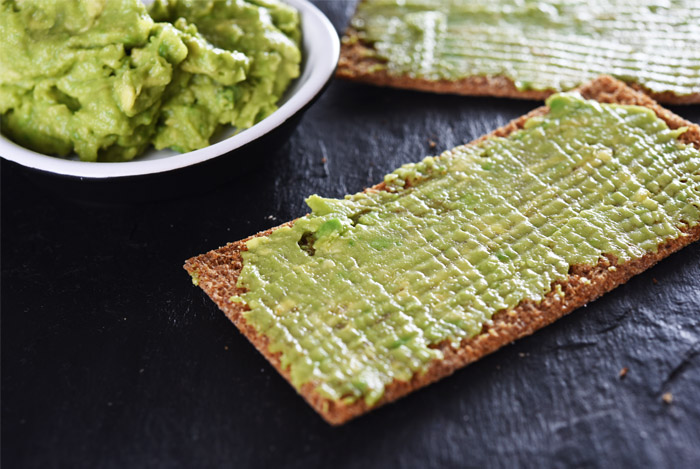
Protects Liver from Disease
Avocado is very good when it comes to reducing liver damage because of its organic compounds that improve liver health (59).
The main cause of liver damage is usually Hepatitis C.
A recent study suggests that avocado plays an important role in protecting the liver from a wide spectrum of conditions (60).
Avocado is considered a superfood for the liver for a few reasons:
- If you are suffering from fatty liver disease, avocado can help you because it contains healthy fats that can improve your cholesterol profile by lowering LDL (the “bad” cholesterol) and raising HDL (the “good” cholesterol).
- Avocado has the ability to produce glutathione, a type of antioxidant which is responsible for filtering out harmful substances from liver and protecting liver cells from damage. Those who suffer from the chronic liver disease are often found to be low in glutathione. Eating avocados is certain to increase glutathione levels in your body.
- Besides glutathione, avocado is also rich in Vitamin C and E, which neutralize free radicals. By neutralizing harmful free radicals, you protect your liver cells from damage.
- Avocado is also well-known for its anti-inflammatory properties. This is because it contains both Vitamin E and K, two nutrients that reduce cellular inflammation. Liver cell inflammation is preceded by cellular injury. Anti-inflammatory properties of avocado will support your liver health.
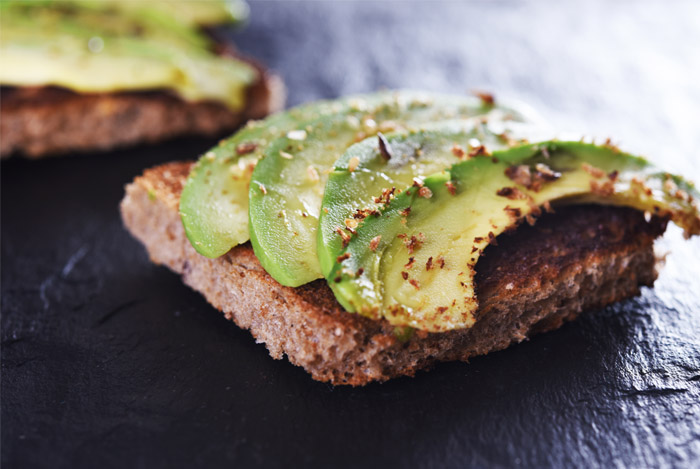
Provides Dental Care
Consumption of avocado will bring back the freshness in your breath.
Many people struggle with bad breath due to indigestion or an upset stomach.
Halitosis is the main cause of bad breath, but it can be eliminated by improving digestive health.
The antibacterial and antioxidant properties of flavonoids found in avocado help you get rid of bad breath because they have the ability to kill the bacteria in your mouth.
Furthermore, avocado has been associated with preventing oral cancers (61).
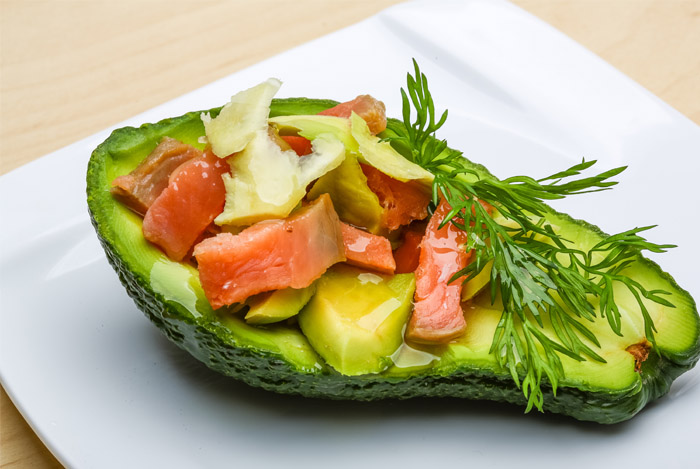
Prevents Vitamin K Deficiency
Even though Vitamin K deficiency is not a frequent health issue, it is often observed in neonatal care.
It may lead to a bleeding disorder, which is known as Vitamin K deficiency-related bleeding (VKDB).
VKDB is mostly caused by an insufficient intake of Vitamin K during pregnancy.
Incorporating avocado into the diet of a pregnant woman will reduce the risk of VKDB in the newborn child.
This is because avocado is a rare fruit containing high amounts of vitamin K.
A single serving of avocado contains 40% of the daily requirements for vitamin K.
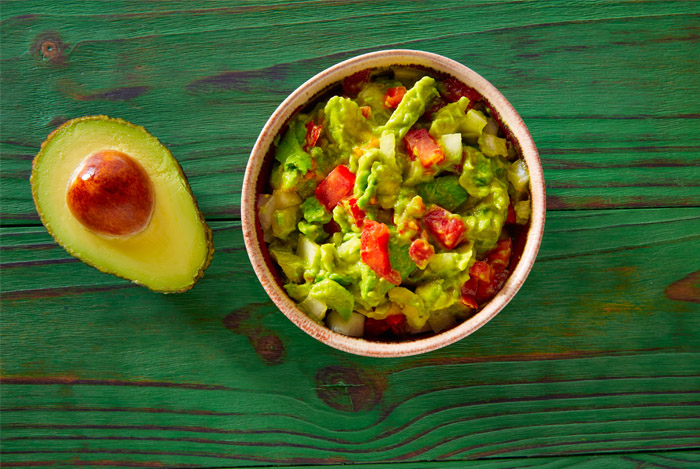
Encourages Longevity
Avocado is one of the fruits associated with healthy aging and longevity because of its potent compounds that regenerate your body.
One of these potent compounds is xanthophyll, which is a powerful antioxidant.
According to one research study, an intake of xanthophyll is likely to decrease signs of the aging process on different parts of your body (30).
Good for Your Bones
Avocado contains carotenoids such as zeaxanthin and lutein.
These are linked to a reduced risk of cartilage defects – the symptom of osteoarthritis (30, 62).
Intake of foods such as avocado, soy, or both may help in lowering the risk of osteoarthritis.
A study investigating the benefits of avocado pear and its effects on osteoarthritis suggests that 300 mg of avocado or soy supplements appear to be beneficial for patients with hip or knee osteoarthritis (37).
Furthermore, the levels of essential minerals in avocados are substantial; they include phosphorus, copper, zinc, and trace amounts of selenium and calcium.
Thanks to all of these compounds, the risk of osteoporosis is reduced and improvements in bone mineral density come as a natural consequence.
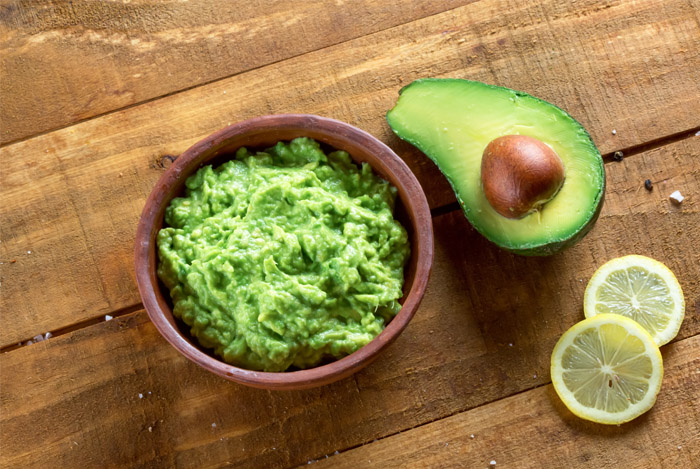
Wound-Healing Activities
Being an excellent source of enrichment for dry, chapped, or damaged skin, avocado can also heal wounds all over your body.
According to a study, health benefits of avocados have been suggested to heal wounds in rats(63).
Namely, the rats were divided into four groups of five and received either topical or oral treatment.
As a result, complete healing was observed in the rats who received either treatment type.
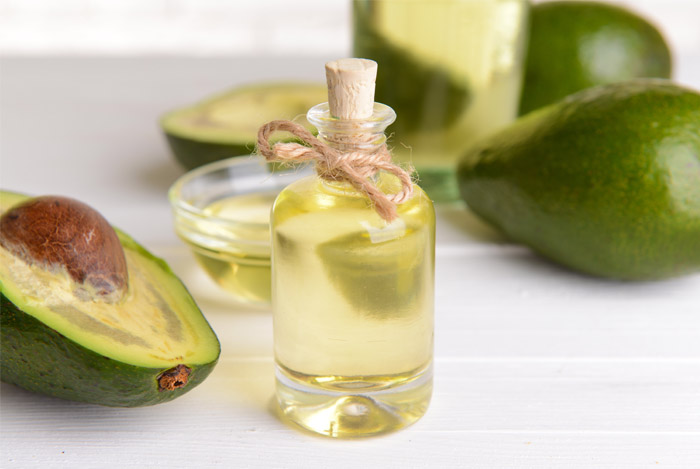
High in Fiber
Avocados contain about six or seven grams of fiber per half-fruit.
While everyone’s system is different, it’s usually recommended that women get about 25 grams of fiber per day and men get 38 grams.
Eating a whole avocado can mean getting about half the fiber a woman needs every day and about a third of the fiber a man needs.
Remember, this much fiber is all from a creamy, smooth, sweet, delicious fruit, not from some bland and dull fiber pill or drink!
Many people know that fiber helps to keep your bowels regulated and reduces the risk of constipation, but getting enough fiber helps your digestion and overall health in a few other ways as well.
One is that fiber helps you to feel full so you don’t overeat.
In turn, your weight can stay at a healthy level.
Fiber also binds to the “bad” cholesterol in your system and helps to flush it out, so it may even be good for your heart!
Nutritional benefits of avocado is another reason to eat more avocados every single day.
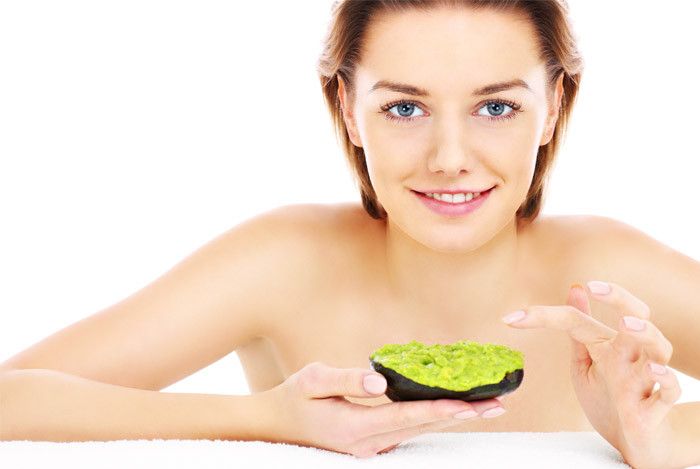
Great for Your Skin
Avocados are high in fat, but these are the “good” polyunsaturated and monounsaturated fats that are healthy for your system, not the saturated fats that clog your arteries and are bad for your circulation.
The “good” fats in avocados can actually protect your skin.
Polyunsaturated fats keep your skin protected from sun damage and inflammation.
Monounsaturated fats keep the top layer of skin moisturized so that it’s healthy and guarded against premature wrinkles.
The vitamins in avocados, including Vitamin C and E, also protect your skin cells by keeping your skin hydrated.
Many people use mashed, raw avocado as a face mask since it contains so many good fats and oils for the skin, taking everything from this benefit of avocado.
Ingesting these oils and vitamins by adding avocados to sandwiches and salads can also protect your skin and keep it looking radiant!
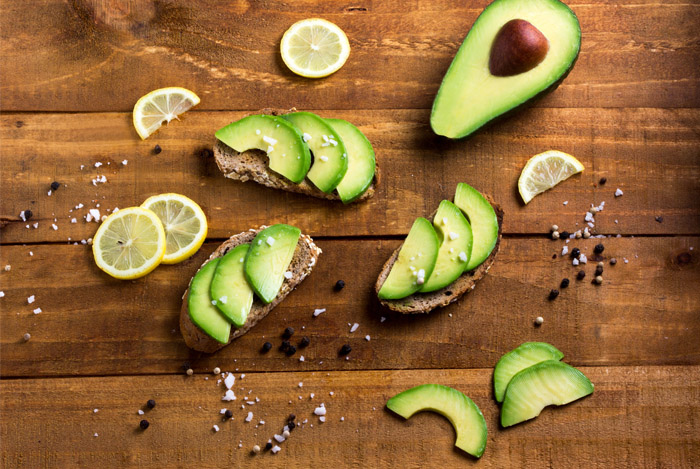
Has a Lot of Lipids
The word “lipids” may sound a bit strange but simply put – lipids are a type of fatty acid.
These fatty acids are the building blocks of healthy cells, but they also do much more for your overall health than just restore damaged cells.
Lipids are thought to allow your body to better absorb carotenoids or beta-carotene.
Beta-carotenes are found naturally in plants and help the body fight off certain cancers, heart disease, and even cataracts.
While you may get carotenoids or beta-carotene in your diet by eating a variety of fruits and vegetables, these carotenoids need to be fully absorbed in your body for them to work as they should.
The lipids in avocados help your body absorb this beta-carotene or carotenoids so that they benefit your immune system and keep you healthy.

Improves Your Mood
Avocados are high in folate, which falls into the family of B vitamins.
You may have heard that pregnant women should get enough folate in their diet, but this substance is good for everyone when it comes to regulating mood. How so?
Homocysteine naturally forms in the body, but too much of this substance will block the production of serotonin and dopamine; these chemicals regulate mood, as well as encouraging restful sleep at night.
Folate in avocados helps to prevent excessive amounts of homocysteine from forming in your body so that it can produce serotonin and dopamine.
In turn, you’re at less risk from depression.
Being able to sleep soundly and regularly can also mean a healthier, happier mood, as you’re less fatigued and will have more energy after a good night’s sleep.
By eating more avocados, you may see that you sleep more soundly and feel more rested and energetic throughout the day, and have a better mood as well.
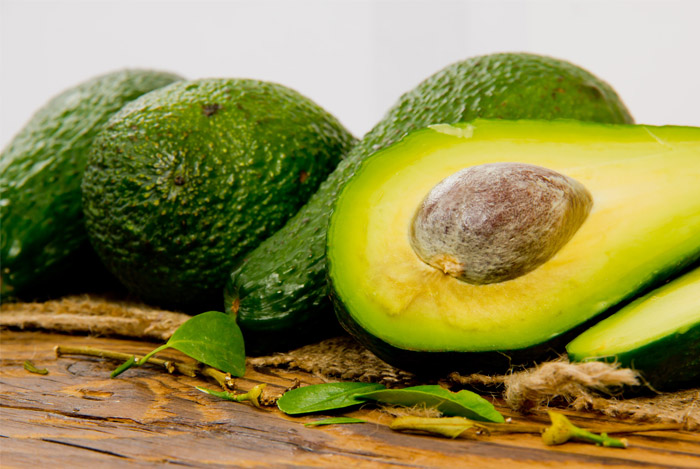
The Best Way to Eat Avocado
First, to have every health benefit of avocado, it should be eaten when ripe.
The only edible part of avocado is the green insides.
Use a sharp knife, set the avocado on the cutting board, and cut it in half.
Once you have cut the avocado in half, rotate the halves just a little bit so that you can tear them apart.
Then, you will have two halves, one of which has the seed.
Pull out the seed from the half by sticking the knife in it a little.
After that, you will have two identical halves.
Now, you need to separate the insides and skin of the avocado.
You will do that by running the knife down through the insides.
Then take the avocado into your hands and the insides will pop out.
This way you will not have any waste.
Precautions
Although avocado is greatly beneficial for your health, you should take into consideration its side effects and be cautious about your daily avocado intake.
If you are on a low-calorie diet, you should avoid eating high amounts of avocado because it is a high-calorie food.
Furthermore, if you are experiencing symptoms such as mouth itches, swollen tongue, heavy breathing, or stomach pain, you may be allergic to avocado and should seek medical help.
If you are allergic to latex, that may be an indicator that you are allergic to avocado because there are findings that suggest a connection between the two.
In addition, the risk of being allergic to avocado is increased in case you are allergic to potatoes, tomatoes, bananas, kiwi, melons, or peaches.
Also, be mindful when taking medications.
If you take Warfarin, an anticoagulant, on a daily basis, it may cause an interaction.
For this reason, always make sure to ask your doctor for help prior to eating avocado and mixing it with medications.
When it comes to daily consumption, it is recommended that you eat somewhere between a half to a full avocado per day.
It is high in calories, which means that eating more than one avocado per day may cause harmful symptoms to your body, such as diarrhea or nausea.
Even though it may not seem like much, one full avocado is just enough for your body to get the most benefits from the fruit.
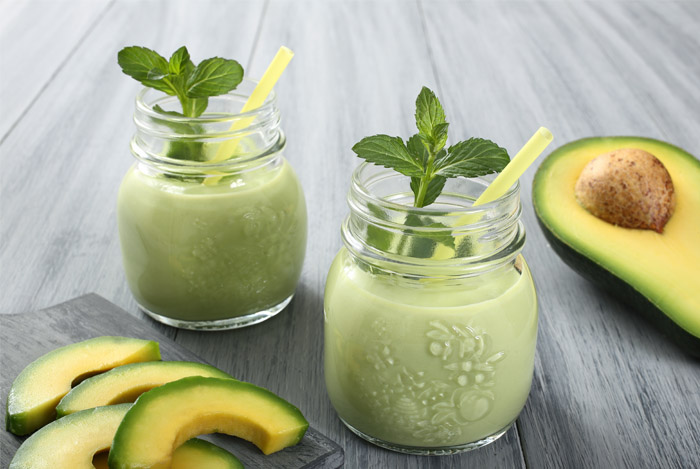
How to Buy Avocado
Get to know the types of avocado
The first thing you need to know when buying avocado is its origin.
There are two major types and producers of avocados in the US.
The produce and its quality may vary depending on your geographical location and on the season.
This is why you may find different types of avocado on the US market.
- California avocados – This type of avocados is available year-round for approximately 80% of the US avocado market. California avocados have different varieties, but one of the most common ones is the Hass avocado. It is different from other avocados because of its rough and bumpy skin. California avocados have a nutty, rich flavor and are relatively smaller compared to their counterparts grown in Florida.
- Florida avocados – These are more seasonal and, unlike California avocados, they are available for only eight months of the year – from July to February. The Florida variety of avocados is a bigger fruit, about twice the size of its California counterpart. However, it offers fewer calories, which makes it less costly.
Determine what you are going to use an avocado for
If you are going to use an avocado for an immediate purpose, choosing a ripe, ready-to-eat avocado would be the best choice.
However, if you are going to buy avocado in advance, it would be better if you buy the firm types and then have them ripen and ready-to-eat at home.
Be mindful of the attributes of the avocados that you are going to buy
- Ripeness: One of the most important things when purchasing an avocado is its ripeness. You may check it by holding the avocado in your hand and gently squeezing it. However, you should be careful not to press the avocado with your fingertips too much as it can cause bruising. If you are holding a ripe avocado, it will not be overly squishy. If it a bit hard, then it is probably underripe and needs a few days to ripen. Nonetheless, you can still buy an underripe avocado and ripen it at home.
- Look: Another attribute to check for is the look of an avocado. Opt for an avocado with unblemished skin. Avocados that are too shiny are still underripe. But, once again, you may choose to buy these and ripen them at home.
- Color: Color is also an important attribute and can vary depending on the variety. California Hass avocados are distinctive for their color, which usually turns dark green or purplish-black as they ripen. On the other hand, Florida avocados have lighter-green skin combined with the yellowish tone even when they are already ripe.
You should avoid buying avocados that are overly soft and mushy.
This means that the fruit is too ripe.
Dark blemishes, bruises, dents, and brown spots should also be avoided when choosing an avocado.
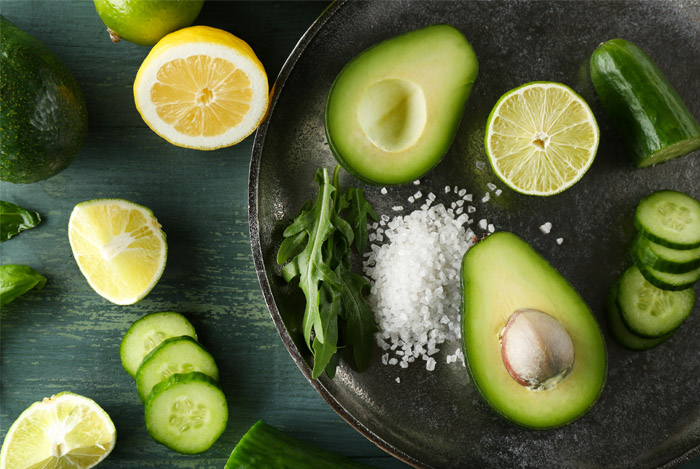
How to Store Avocado
If you have a fresh avocado, you can store it in its cut and uncut form.
Time will vary when it comes to how long you can store fresh fruit.
Be it cut or uncut, ripe or unripe, all of these factors will play a role in how long the fruit can be stored.
Cut avocados are naturally susceptible to oxidizing if left unprotected, thus turning brown.
You may ask why they turn brown when you cut them.
When you cut an avocado, its cellular walls get broken which causes oxidation to occur.
However, this process of oxidation can be prevented.
All you have to do is add an acidic agent to an avocado and limit the surface area that is exposed to the air to keep the avocado benefits.
Here are some of the best recommended acidic agents:
- Orange juice
- Lime juice
- Lemon juice
- Onion
- Tomatoes
- Vinegar
You can limit the exposed surface area by covering it tightly with a clear plastic wrap or placing in an air-tight container.
Also, leaving in the avocado pit or seed can cause the protection of the surface area exposed to air.
Nonetheless, it is recommended that you use the first method mentioned for best results.
Store Cut Unripe Avocados – If you are holding a Hass avocado which is unripe, you should sprinkle the exposed flesh of the avocado with lime or lemon juice, place two halves together, and cover tightly with clear plastic wrap before leaving it in the refrigerator.
Remember to check the avocado from time to time to see if it has softened up enough and become edible.
The ripening process of the avocado will differ depending on temperature conditions and firmness of the fruit.
Store Cut Ripe Avocados – In case you want to store a cut ripe avocado, you should first add lemon or lime juice or another acidic agent to the avocado and place it in an air-tight container or some tightly-covered clear plastic wrap.
Once you have done that, you can store the fruit in your refrigerator for a day.
Store Guacamole – Guacamole is often packed with other ingredients that affect how long and how well it can be stored.
For the most guacamole recipes, the method is the same as those mentioned above.
Adding an acidic agent on top of the guacamole will prevent oxidization.
In order to store and preserve guacamole, you should place it in an air-tight container and wrap the guacamole on the surface before covering it so as to prevent oxidation.
Also, you should store it in the refrigerator.
In case guacamole turns brown during storage, remove the top oxidized layer.
Store Ripe Uncut Avocados – In case your avocado is ripe and you have not cut it open, you can store it in the refrigerator for two to three days.
Store Unripe Uncut Avocados – If you want to have your avocado ripen, store it at room temperature for four to five days.
You should avoid storing it in the refrigerator because it can slow the ripening.
You will get best results if you store unripe fruit at room temperature.
Avoid storing it if the room conditions exceed the range of 65-75 degrees F.
How to Grow Avocado
Growing an avocado tree is not a difficult thing to do.
Follow these simple steps and you will have a successfully planted avocado tree.
- Remove the large pit (seed) from the insides of an avocado, rinse and dry it well.
- Put three or four toothpicks into the seed at its widest part in order to suspend the pit over a glass of water.
- After that, put it in a warm place and make sure that you maintain the water level.
- In two to six weeks, you will notice that roots and a stem are sprouting from the seed. The moment the stem is about six inches long, you should trim it in half.
- When the stem leafs again, you should transplant the seedling into a pot that has sandy, loose soil.
- Provide your plant with frequent and light watering. Also, keep it in a sunny place to promote the plant growth.
- After that, pinch back the most recent grown leaves every time the stems grow another six inches or so. Do this in order to encourage more growth and a fuller plant.
In the regions that are warmer, the avocado plant is capable of surviving and staying outside in the summer.
In case you are situated in a warm climate that does not exceed temperatures less than 45 degrees F, you can even move your avocado outside because the plant will certainly enjoy such weather conditions, which will ultimately encourage its growth.
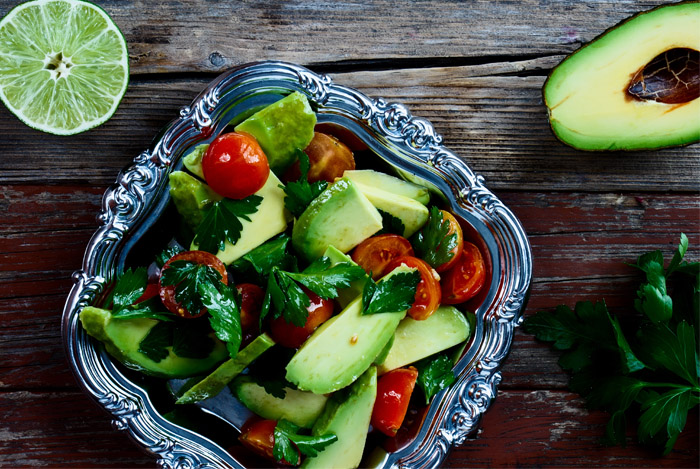
Conclusion
Avocado is a very potent, incredibly nutritious, and filling plant.
It is rich in many minerals, vitamins, and different plant compounds, and is also beneficial for heart health and prevents arthritis.
In case you are a person leading a healthy lifestyle, you can easily incorporate avocado health benefits into your diet.
With all these great health benefits, is it no wonder that avocados are becoming such a popular choice for healthy dishes.
Why not try some on your next salad or use them to top off a sandwich?
Or make sure that guacamole is on the table when you’re serving chips or veggies as a side dish?
You may be surprised at how healthy you will feel inside and how great your skin looks outside once you start adding avocados to your everyday diet.
FDA Compliance
The information on this website has not been evaluated by the Food & Drug Administration or any other medical body. We do not aim to diagnose, treat, cure or prevent any illness or disease. Information is shared for educational purposes only. You must consult your doctor before acting on any content on this website, especially if you are pregnant, nursing, taking medication, or have a medical condition.
HOW WOULD YOU RATE THIS ARTICLE?
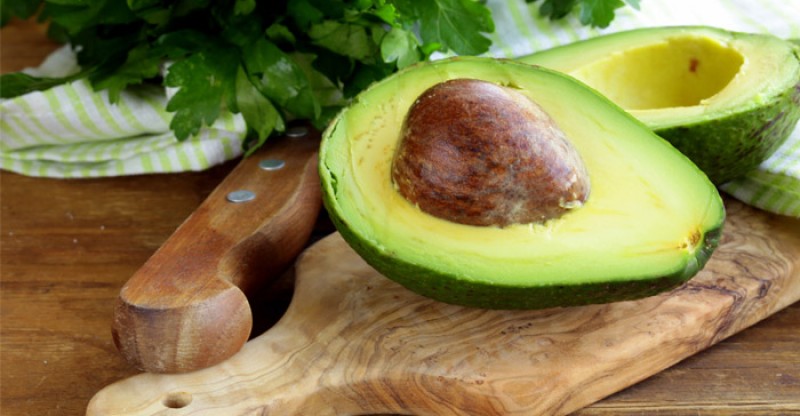


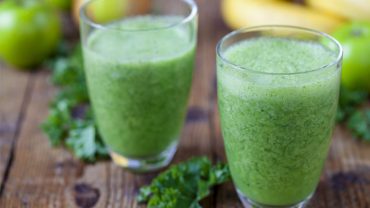



Avocado is great. I try to eat at least one avocado each day.
Good for you, William! I’m trying to eat at least one avocado a day as well.
Love avocado but had no idea you could grow it yourself. I know what I’ll be up to this weekend! Great article, by the way! Thanks, Helen!
You are welcome, Michael!
I’ve been on avocados for about a month now. I honestly do feel better day-to-day.
I’m glad you are feeling better, Lucinda!
Great information about avocado
Thanks Ann!
Can a person grind the seed and dry it and then sprinkle it on salads and etc
Hi Helen,
The seed itself doesn’t taste that good, it is quite bitter :). I’ve read somewhere that you can make it taste better, but I’m not sure if it is worth going through the trouble.
I put the seed in to my vitamix when making a smoothie. You don’t taste the bitterness at all, and it is extremely high in vitamins and fibre.
This article is very informative
Thanks! I’m glad you liked it and appreciate if you’d share it on your social media accounts :).
Very informative
Thanks!
Wow, I love the amount of thoroughness in information of benefits as well as everything else about types of avocados and guac you put in this! I’m a fan now, let’s check more of your articles 🙂 I’m trying to have a minimalistic healthy raw diet but not sure what foods I should keep. Avocados/Guac is on the list!
Thanks, friend! 🙂
Supposedly, guacamole will last longer, if the seed is put back into it after preparation.
I haven’t tried that. I always try to eat my guacamole either same day or next day. I don’t think you can store it longer, with seed or without :).
Hi! I was just passing by, looking for information and sources for my research paper until I found this blog and I am actually wondering when was the date when this blog was posted. Thank you.
we are very appreciated about avocado, l will try to use it, to see how it will walk in my body. thanks alot. can l get it in nothern nigeria? l wish you the best helen nicholas
Thanks, Mr. Rabiu!
I have just learnt that the avocado seed is very good in terms of improving blood levels. Would be interested to hear more on this.
I am also aware that the skin can be used as a facial scrub.
Should I store ripe avocado in the fridge, and for how long?
I always store avocados in a fridge, I don’t know why, but every time I leave one outside, it over ripens pretty quickly. I also don’t buy a lot of them, usually just one or two. This way I know that I can eat them before they become over riped.
I’ve always thought avocados are so fatty and I’ve had no idea this fat is actually healthy one! Now I’m aiming to add at least one avocado a day to my diet!
Hi Helen, I am a final year Nutritional Medicine student in Australia. I’m doing an assignment on the Beautiful Avocado. This article is really informative and a great reference guide. Fantasticly useful and easy to understand. Thank you.
Thanks,
I’m very happy you found it useful!
very educative and helpful in medicinal aspect of life
Hello Aliyu! Thank you! I’m glad you assessed my article!
Nice health benefit tips,, really helpful for every viewer…
Hi Tridip! Thank you!
Is skin of avocados edible? I read this is where all the nutrients are.
In this article, it’s claimed that avocado is good for skin. But is it good for oily skin? Wouldn’t avocado make my skin even more oily? I’m not talking about the mask of avocados, just about eating them. Will I get the benefits or worse my skin’s condition?
What way is the best to eat avocados? Is it still beneficial when chopped/cooked?
Thanks!
I have been eating avocado regularly for about eight days now. The benefits are enormous. . Incidentally I have just learnt I cannot eat more than one a day. Thank you for the article
What a wonderful insight! I never knew avocado is this beneficial to our health. Thank you so much
Hello Frank, nice to know you found this article useful! You are always welcome:)
What about avocados for diabetics? Can their cholesterol-lowering properties help prevent cardiovascular disease in diabetes patients?
Excellent article on the benefits of avocado.
Hi, Karen! Thank you!
What is daily recommended quantity of avocados for pregnant women? Should the pregnant eat more than one avocado a day?
Love the avocado. I make a dark chocolate pudding with almond milk, maple syrup, w/ stevia bit of salt and vanilla that is so wonderfully satisfying. I fill 5oz. containers which I keep frozen. Just pop it out of it’s container. It will defrost in a couple of hours. Then topped with Greek yogurt that really compliment the flavor.
Hi Helen Nichols
Wow ….. What a wonderful article on avocado in fact have never thought of it. Helen last week I started a research on health benefit of avocado seed . Here in Ghana west Africa the seed are wasting everyday. And have found out that they are good for heart diseases.
i still eat half an avocado at a time every day xD ty for the article
God has given us this fruits for our health. so key into it.
Never realised avocados had so many healthy elements in them. I shall try to eat one every day from now on. Have already tried a face pack using mashed avocado. Skin looks and feels a lot better. Thank you for a very informative article.
😄Thank you! Helen for the great info on avocado. I have just acquire the taste of this nutritious fruit and I am getting to love it more and more.